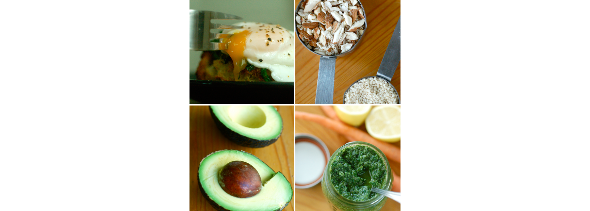The nutrients in fats and oils are necessary in our diet yet you won’t see a Fats & Oils food group on My Plate. That’s because fats and oils come from foods already part of the five food groups. The fats and oils we eat originally come from animals, vegetables, grains, dairy and even fruits.
But not all fats and oils are equally healthy. Making healthier food choices begins with learning about the different types of fats.
There are three types of fats: saturated fats, trans fats and unsaturated
Saturated fats and trans fats are solid at room temperature. Meat and dairy products are high in saturated fats and trans fats are created from vegetable oils exposed to a chemical process called hydrogenation. These two types of fats raise LDL cholesterol blood levels which can lead to higher risks of heart disease, stroke, high blood pressure and other health problems. You should avoid or limit foods containing saturated fats and trans fats, which include:
- Butter, milk fat, beef fat, chicken fat, cream, solid shortening, lard, some margarines, baked goods, snack foods and other processed foods made with partially hydrogenated oils.
‘Good’ fats or unsaturated fats (also called monounsaturated and polyunsaturated fats) help to lower cholesterol levels in the body and may decrease your risk of heart disease and other serious illnesses. Healthy oils are liquid at room temperature and come from grains, vegetables, fruits, nuts, and seeds. Healthy fats are also found in fatty fish, nut butters and avocados.
What to Eat? Choose these foods as part of a healthy diet
Foods with unsaturated fats include:
Fatty Fish: current dietary recommendations are to include fish in your meals at least twice a week. Fish high in omega-3 fatty acids are salmon, albacore tune (fresh and canned), sardines, lake trout and mackerel.
Oils: when cooking or baking replace solid fats such as butter or margarine with oils from plants such as corn or canola oil. Try olive oil in homemade salad dressing or to sauté vegetables, seafood, meat and poultry. Peanut oil is especially good for high heat stir frying and making popped corn.
Flaxseed: add ground flaxseed to breakfast cereal, yogurt, baked goods, mixed dishes, and casseroles. Other popular seed choices are sunflower, pumpkin, sesame and poppy. Store them in the fridge or freezer because the delicate oils can spoil in warm kitchens.
Nuts: In addition to heart healthy fats, nuts are a good source of protein, fiber, and a variety of vitamins and minerals. A handful of nuts and apple slices make for a filling and well balanced afternoon snack.
Avocados: Avocados not only contain unsaturated fat, but are also packed with folate, Vitamins C, E, B6, potassium and fiber. Add the nutty and creamy flavor of cubed or sliced avocado to salad, salsa, eggs and sandwiches.
“Fats/Oils” by jacqueline / CC license



